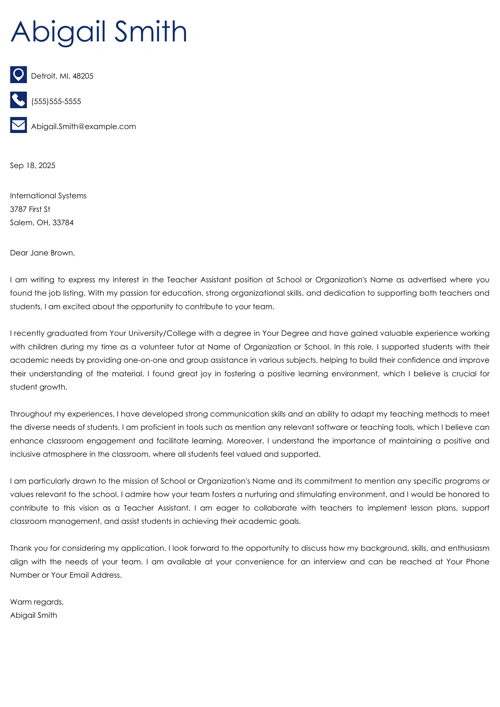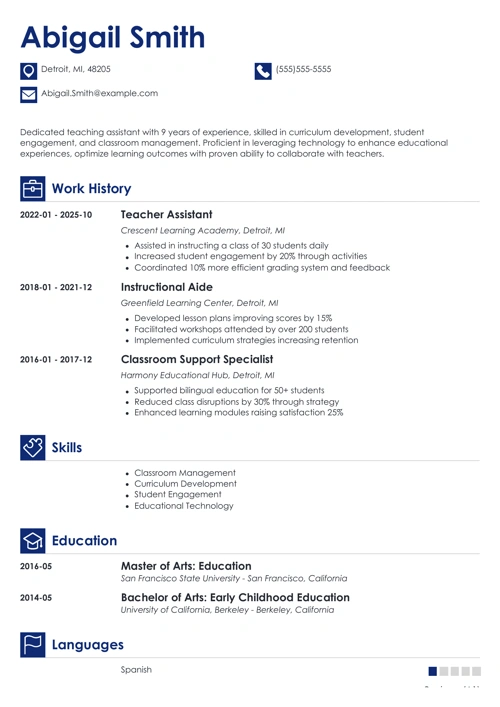You might’ve heard that “Dear Sir or Madam” is the way to address a letter formally. Do you think you should use it when you want to sound professional, respectful, and sophisticated?
Well—in reality, if you write “Dear Sir or Madam” on a cover letter or business email, you’re more likely to get an eye roll than a head nod. So let’s update your knowledge and learn the best alternatives for “Dear Sir/Madam.”
Read this guide to learn:
- What using “Dear Sir or Madam” will say about you.
- Is “Dear Sir/Madam” really the best “To Whom it May Concern” alternative.
- Why you should avoid this business letter salutation.
- Better alternatives to “Dear Sir or Madam”.
Want to write your cover letter fast? Use our cover letter builder. Choose from 20+ professional cover letter templates that match your resume. See actionable examples and get expert tips along the way.
Sample cover letter for a resume—See more cover letter samples and create your cover letter here.
Check out these similar guides on writing cover letters:
- Cover Letter Title
- Cover Letter Enclosure
- Cover Letter Outline
- Career Change Cover Letter
- Cover Letter Format Tips
- Cover Letter for Internal Positions
- How to Write a Cover Letter With No Experience
- How to Write a Killer Cover Letter
- What a Cover Letter Should Say
- Perfect Cover Letter Examples For Any Job
“Dear Sir or Madam” as a Letter Salutation
“Dear Sir or Madam” is a formal way to address a letter to a specific person whose name, title, or gender is unknown. There are certain situations when this letter salutation can be used, but it’s best to avoid it as it comes off as old-timey, impersonal, and lazy.
The reason why these generic letter salutations should be avoided is because you’re always better off addressing the letter using the recipient’s name. And with the advent of the internet, there’s almost no excuse for not knowing who you’re writing to.
But what if you’ve scoured the internet and still came up empty-handed? Can you use “Dear Sir or Madam” then?
Even in that case, there are better alternatives. Let’s explore what’s wrong with “Dear Sir or Madam” and when to use each alternative.
Is “Dear Sir or Madam” Appropriate for a Cover Letter?
No it isn’t—“Dear Sir/Madam” should be avoided whenever possible; it’s one part of a cover letter that you can feel safe leaving out. While not always inappropriate, there are much better alternatives if you want to give a good impression from the start.
To illustrate why, let’s walk a mile in Mary’s shoes. Who’s Mary? She’s the hiring manager at Acme Co. looking for a new marketing coordinator. Mary is busy at work reviewing candidates when she receives a notification there’s a new applicant. A resume arrives in her inbox with a cover letter attached. The first thing she reads is “Dear Sir or Madam”...
Now—what does that salutation tell Mary? A few things. She automatically knows: (a) the sender is a stranger who didn’t bother to look up her name, and (b) the letter’s contents might be a generic cover letter that’s been copy-pasted a hundred times. Do you think Mary feels inspired to carefully read the letter and give her utmost attention?
Chances are Mary is going to spend a few seconds skimming the letter and go straight to the resume.
Read more: Perfect Cover Letter: How to Write One?
“Dear Sir or Madam” in Emails
Avoid using “Dear Sir/Madam” in emails as well. Emails are less formal than cover letters, so starting with “Dear Sir or Madam” feels even more out of place. It’s always best to address an email directly to the recipient.
Read more: Email Cover Letter Sample
Why “Dear Sir or Madam” Falls Short
Here’s what the problems with “Dear Sir or Madam” boil down to:
- It’s generic and lazy. You have the Internet at your fingertips. You should be able to Google something—anything more specific than Sir or Madam. Even if you can’t find a specific name, you should be able to find a specific department or position.
- It’s outdated. Unless you’re writing a letter to someone at the Royal British Society, chances are the recipient will wonder how you time-traveled from 19th-century Victorian England.
- It’s not gender inclusive. The recipient may not identify as a Sir or a Madam. In that case, your recipient hasn’t even started reading your letter and you’re already off on the wrong foot.
If that’s the case, what would be better than “Dear Sir or Madam” for emails, cover letters, and business letters?
Read more: Great Cover Letter Tips [35+]
Creating a resume with our builder is incredibly simple. Choose a resume template and follow our step-by-step guidance to have a professional resume ready in minutes.
When you’re done, our online resume builder will score your resume and our resume checker will tell you exactly how to make it better.
“Dear Sir or Madam” Alternatives
The ideal cover letter uses warm and natural language, and speaks directly to the hiring manager. Essentially the opposite of a phrase like “Dear Sir or Madam” or "To Whom It May Concern”.
The best cover letter salutation is one that is addressed directly to the hiring manager using their name, such as:
- Dear Mr. Liu,
- Dear Ms. Patton,
- Dear Dr. Perez,
Now, let’s say you’ve looked everywhere. Even if you don’t know the name of who will be reading your resume cover page, you should avoid “Dear Sir/Madam”. If you can’t find their name anywhere or think that multiple people may be reading it, you can use:
- Dear Hiring Manager,
- Dear HR Manager,
- Dear [Department] Manager
- Dear Recruiter,
- Dear Recruitment Team,
- Dear Recruiting Manager,
- Dear [title of the person you would be reporting to],
Read more: How to Address a Cover Letter
Is “Dear Sir or Madam” a good “To Whom It May Concern” Alternative?
“Dear Sir or Madam” shares a lot in common with “To Whom It May Concern”. Both are used to address letters to strangers—and both are considered outdated and old-fashioned.
However, that doesn’t mean they’re interchangeable. “To Whom It May Concern” is suited for situations when you’re not sure who would be responsible for your inquiry. “Dear Sir/Madam” is better for when you are writing to a specific person, you just don’t know their name.
Read more: Letter of Intent vs Cover Letter: What’s the Difference?
“Dear Sir or Madam” Punctuation and Capitalization
Poor grammar is one of the primary reasons that cover letters are rejected. So if you are going to buck the trend and use “Dear Sir or Madam” anyways, here’s how to use it correctly.
The proper punctuation is to capitalize each letter except in the word “or”, as in:
Dear Sir or Madam,
[Space]
First paragraph of the cover letter
Using a colon after salutations is acceptable in formal situations, so you can also write “Dear Sir or Madam” with a colon:
Dear Sir or Madam:
[Space]
First paragraph of the cover letter
You might be wondering if you can switch the order and write “Dear Madam or Sir”, but this would likely turn heads. It’s best to catch the hiring manager’s attention with the body of your cover letter rather than the greeting. Just make sure the rest of your cover letter is formatted correctly.
Read more: The Best Way to Start a Cover Letter
Plus, a great cover letter that matches your resume will give you an advantage over other candidates. You can write it in our cover letter builder here. Here's what it may look like:
See more cover letter templates and start writing.
Key Takeaway
While figuring out how to address a cover letter can be tough when you don’t know the hiring manager’s name, here are some tips:
- Avoid “Dear Sir or Madam” because it’s impersonal, outdated, and not gender inclusive.
- Try hard to find the hiring manager’s name, as that’s the ideal way to address a cover letter.
- Use proper punctuation and capitalization if you are going to use it anyways, “Dear Sir or Madam,” or “Dear Sir or Madam:”.
There you go! Now you can get on to writing the rest of your cover letter!
About Zety’s Editorial Process
This article has been reviewed by our editorial team to make sure it follows Zety's editorial guidelines. We’re committed to sharing our expertise and giving you trustworthy career advice tailored to your needs. High-quality content is what brings over 40 million readers to our site every year. But we don't stop there. Our team conducts original research to understand the job market better, and we pride ourselves on being quoted by top universities and prime media outlets from around the world.





